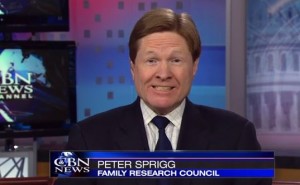Equality Matters latest post reveals how the Family Research Council (FRC) used actor and comedian Robin Williams’ suicide to champion discredited “ex-gay” therapy, comparing treatment for mental illness to treatment for homosexuality.
In an August 18 post for the FRC’s blog, Senior Fellow for Policy Studies Peter Sprigg compared the late actor’s struggles with addiction and depression to people struggling with “unwanted same-sex attractions.” Noting that states like California and New Jersey have ban

ned so-called “sexual reorientation therapy” – which is opposed by the American Psychological Association and has been associated with psychological damage in patients – Sprigg asked why social liberals aren’t also trying to “outlaw rehab”:
In the wake of Williams’ suicide, many TV commentators and friends of the late star talked about the challenges of mental illness (Williams suffered from depression), addictions — and rehab. I saw comedian Andy Dick say, “I’ve been to rehab seventeen times.”
In light of this history, I have only one question for socially liberal political activists — why aren’t you trying to outlaw rehab?
I ask the question because such activists are trying to ban a form of mental health treatment — not drug and alcohol rehabilitation, but “sexual orientation change efforts” (“SOCE”), also known as “sexual reorientation therapy.” Such therapy involves assisting people with unwanted same-sex attractions to overcome them.
Why would someone want to change their sexual orientation? Some such individuals are simply disillusioned by their experiences in homosexual relationships. Some have legitimate concern about the well-documented health problems associated with homosexual conduct (especially among men), such as high rates of sexually transmitted diseases, of which HIV/AIDS is only one example. Others may seek help in conforming their behavior and lifestyle to the teaching of the religious faith to which they are committed. Some may aspire to a traditional family life, raising children in a home with both their mother and father present.
Whatever the motivation, there are those who have simply made a choice to walk away from the homosexual lifestyle, without clinical help — much like how Robin Williams simply stopped using drugs and alcohol in the 1980’s. Others have sought professional help, perhaps at the urging of family members, in the form of “sexual reorientation therapy” — much like when Williams entered a formal alcohol rehab program in 2006. Whether simply through personal development, religious counseling, or with the help of a licensed or unlicensed counselor, thousands (if not millions) of people have experienced significant changes in one or more of the elements of their sexual orientation (attractions, behavior, or self-identification). [emphasis added]
Sprigg’s use of Williams’ suicide to advocate “ex-gay” therapy dovetails with his long history of anti-gay commentary. In 2008, he declared that he would “much prefer to export homosexuals from the United States than to import them into the United States.” Citing the “discredited research and junk science” peddled by Sprigg and other figures like FRC president Tony Perkins, the Southern Poverty Law Center designated FRC an anti-gay hate group in 2010.
Sprigg is a frequent cable news spokesman for social conservative causes, having recently appeared on CNN, CBS News, and Fox News to comment on LGBT-related legislation.











